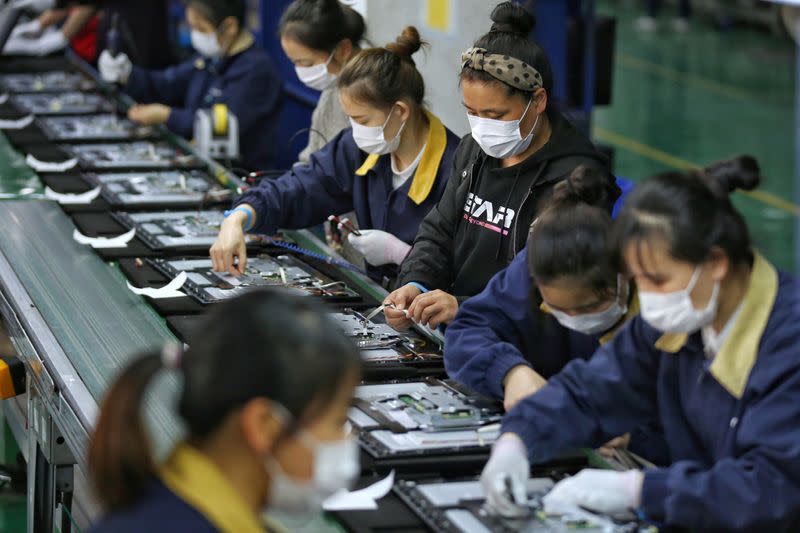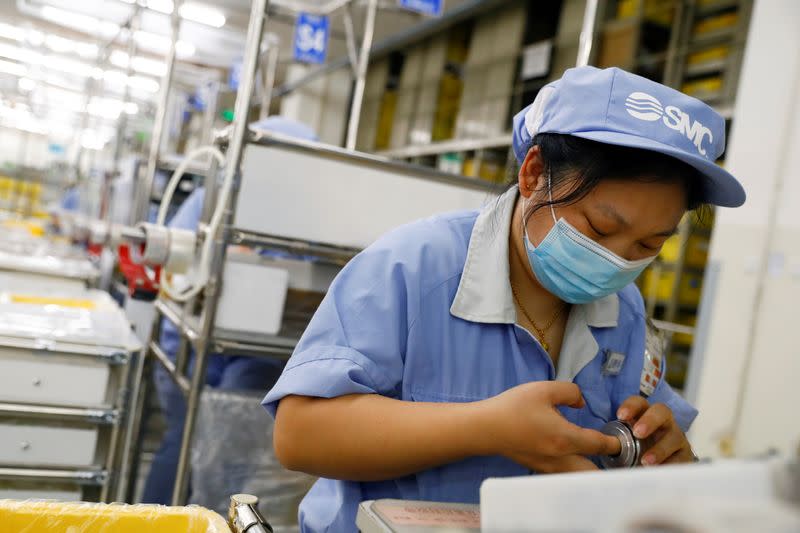China's stunning export comeback has factories scrambling for workers
By Gabriel Crossley and Stella Qiu
BEIJING (Reuters) - China's manufacturing recovery, fuelled in part by demand from COVID-constrained consumers abroad, has soared past expectations this year, so much so that factories are now struggling to fill a shortage of blue-collar workers to clear mounting orders.
The country's output of industrial robots, computer equipment, and integrated circuits has roared back from its coronavirus paralysis - production for the year to November is up 22.2%, 10.1% and 15.9%, respectively.
Much of the manufacturing boom has come from foreign demand, with export growth topping expectations for eight of the last nine months.
The remarkable turnaround comes as China has mostly eradicated the virus and contrasts with the sluggish comebacks seen in major industrialised peers, where factories are still struggling with pandemic disruptions and the hit to demand.
China's global export share increased to over 13% in the second and third quarters from 11% last year, according to Nomura, the highest for any quarter since at least 2006 when the investment bank started compiling the data.
While emergency stimulus in the United States and Europe pumped money into consumers' wallets, the fight to contain the virus in those markets fired up demand both for China-made PPE goods and gadgets for westerners stuck at home.
Government data shows that in November there were more people employed in the industrial sector in Jinhua city, which includes the eastern export hub of Yiwu, than there had been at any time since end-2017.
"We laid off about 50 workers in the first half, and now with orders soaring, we're short of staff and not able to further ramp up production," said Deng Jinling, who owns a thermal flask factory in Yiwu, selling to the Middle East, United States and Europe.
"We tried hiring dozens of temporary workers but they're not good enough," said Deng.
Some workers she laid off have found jobs back home and are not willing to travel back just a few months before the upcoming Lunar New Year holidays in February.
But with clients chasing her heels, Deng bought two automated production lines at the end of November to boost efficiency.
"We've never thought about doing this before, but this year has been so busy and we've exhausted our options," she said. "One automated production line is the equivalent of 10 workers."
A private index by Renmin University tracking demand for blue-collar labour hit a record in the third quarter. Some factory managers have hiked wages by 25% to 10,000 yuan ($1,530) per month, well above the average starting wage for graduates, according to local media.
BEST YEAR
For China's bicycle industry, 2020 is the best year in a decade, with consumers abroad craving exercise and ways to avoid public transport, said Liang Xiaoling, general manager at Guangzhou-headquartered Trinx Bikes.
"Our capacity maxed out in September and October, and we hired a lot of temporary workers to catch up with the demand," said Liang, adding that orders are now stretching into 2022.
His factories now employ about 100 extra temporary workers on top of 1,000 or so regular staff.
Although manufacturing investment was slow to recover, falling 3.5% over the first 11 months, strong export demand helped it rebound in the last quarter.
Investment jumped 12.5% year-on-year in November, up from 3.7% in October, according to research from analysts at CICC, an investment bank.
Zhang Qinming, who owns a company manufacturing speakers for European and American markets, says demand is 25% higher than in previous years.
He's been paying his normal staff overtime to keep up and has also hired temporary workers for about 18-19 yuan an hour, 20% more than his full-time workers. As a last resort, he's leased other factories to take the load.
LIMITED OPPORTUNITY
A labour crunch isn't the only constraint.
China's lopsided trade balance - exporting three containers for every one imported recently - and delays in containers returning to China due to the pandemic overseas, have created severe shipping bottlenecks, now starting to pinch exports.
The yuan is also hovering near multi-year peaks against the dollar, pressuring profits further. And an official gauge of factory raw materials costs reached the highest level since 2017 in November.
Despite the red-hot demand, Liang, of Trinx Bikes, said profits are being squeezed. "Some of our orders are already seeing some losses," he said.
But for policymakers, the export boom has been a welcome one in a tough year. The surprising resilience of China's export sector, which employs around 180 million people, has reduced the need for massive stimulus to revive the economy this year, said analysts.
China hit 122% of its annual job creation target by end-November.
But manufacturers don't expect this boom to last as other economies ramp up production.
"It started with the pandemic, so it will end with the vaccine rollout," said Liang.
($1 = 6.5372 Chinese yuan)
(Reporting by Gabriel Crossley and Stella Qiu; Additional reporting by Beijing newsroom; Editing by Sam Holmes)

 money
money 

